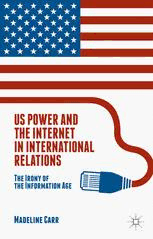
US Power and the Internet in International Relations: The Irony of the Information Age PDF
Preview US Power and the Internet in International Relations: The Irony of the Information Age
US POWER AND THE INTERNET IN INTERNATIONAL RELATIONS The Irony of the Information Age Madeline Carr US Power and the Internet in International Relations This page intentionally left blank US Power and the Internet in International Relations The Irony of the Information Age Madeline Carr SeniorLecturerinInternationalPoliticsandtheCyberDimension,Aberystwyth University,UK Palgrave macmillan ©MadelineCarr2016 Softcoverreprintofthehardcover1stedition2016978-1-137-55023-1 Allrightsreserved.Noreproduction,copyortransmissionofthis publicationmaybemadewithoutwrittenpermission. Noportionofthispublicationmaybereproduced,copiedortransmitted savewithwrittenpermissionorinaccordancewiththeprovisionsofthe Copyright,DesignsandPatentsAct1988,orunderthetermsofanylicence permittinglimitedcopyingissuedbytheCopyrightLicensingAgency, SaffronHouse,6–10KirbyStreet,LondonEC1N8TS. Anypersonwhodoesanyunauthorizedactinrelationtothispublication maybeliabletocriminalprosecutionandcivilclaimsfordamages. Theauthorhasassertedhisrighttobeidentifiedastheauthorofthiswork inaccordancewiththeCopyright,DesignsandPatentsAct1988. Firstpublished2016by PALGRAVEMACMILLAN PalgraveMacmillanintheUKisanimprintofMacmillanPublishersLimited, registeredinEngland,companynumber785998,ofHoundmills,Basingstoke, HampshireRG216XS. PalgraveMacmillanintheUSisadivisionofStMartin’sPressLLC, 175FifthAvenue,NewYork,NY10010. PalgraveMacmillanistheglobalacademicimprintoftheabovecompanies andhascompaniesandrepresentativesthroughouttheworld. Palgrave®andMacmillan®areregisteredtrademarksintheUnitedStates, theUnitedKingdom,Europeandothercountries. ISBN978-1-349-71539-8 ISBN978-1-137-55024-8(eBook) DOI10.1057/9781137550248 Thisbookisprintedonpapersuitableforrecyclingandmadefromfully managedandsustainedforestsources.Logging,pulpingandmanufacturing processesareexpectedtoconformtotheenvironmentalregulationsofthe countryoforigin. AcataloguerecordforthisbookisavailablefromtheBritishLibrary. AcatalogrecordforthisbookisavailablefromtheLibraryofCongress. For my family, Joan, Reg and all the Francis women – you know who you are This page intentionally left blank Contents Acknowledgements viii 1 Introduction 1 2 InternationalRelationsMeetsTechnologyTheory 16 3 A(Select)PoliticalHistoryoftheInternet 45 4 CyberSecurity 77 5 InternetGovernance 117 6 NetworkNeutrality 149 7 Conclusion 182 Notes 191 Bibliography 197 Index 218 vii Acknowledgements I take this opportunity to thank Professor Lorraine Elliott for her guidance, intellectual input and continuing friendship. She has fun- damentally shaped me as a scholar and I am fortunate to know her. I also thank Christian Reus-Smit for setting an excellent example of collaboration,intellectualrisktakingandmakingworkfun. viii 1 Introduction Over the course of the past two decades, much of the world has devel- oped a dependence upon an unsecured, open computer network for communications,financialtransactions,militaryweaponssystems,crit- icalinfrastructure,commerceanddiplomacy.Despitethepervasiveness of the Internet and its importance to a wide range of state functions, we still have little understanding of the implications of this technol- ogy for power in the context of international relations (IR). How does Internettechnologyrelatetoothermaterialelementsofstatepowerlike the economy and the military? What are the implications for social powerfactorslikelegitimacyandauthority?Whydostatesadoptdiffer- entapproachestoInternettechnology?AnddoestheInternetproduce universal outcomes or does its impact on state power differ depending oncontext?Answerstoquestionsliketheseareessentialtotheanalysis ofwhatthisdynamictechnologymeansforourunderstandingofstate powerintheinformationage.However,thecomplexwaysthatInternet technology is embedded in civil, political, economic and military sys- tems in developed states mean that this has proven extremely difficult toanalysewithanyclarityinageneralizableway. Existing IR theories of power, developed in the context of industrial technology,havestruggledtoincorporatetheInternetandaddressthese questions.Formuchofthe20thcentury,scholarsofIRhaveapproached the relationship between power and technology in a relatively stable and consistent manner. Technology has been largely understood as a constitutive and material element of state power. Its military and economic relevance has led to an understanding of technology as a mechanism through which power (or security)-seeking states pursue relative advantage by the development of more efficient production methods (economic power) as well as advanced weaponry (military power)(Morgenthau,1978,p.322).Thishasbeenthepredominantview 1
